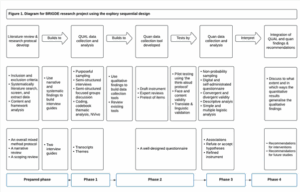The BRIDGE project: Research to improve discharge guidance for South Asian families affected by congenital heart disease
In this blog, Dr Luong Tran, a PhD student researcher at Birmingham City University, describes the design of the BRIDGE study to improve discharge planning for non-English-speaking parents and explains how the study contributes to addressing research gaps in the UK. The study is supervised by Professor Kerry Gaskin, @GaskinKerry Associate Professor Kate Thomson, and Professor Jo Wray @dr_jowray
The BRIDGE study is planned in the context of concerns regarding the increased under-5 mortality trend in the UK (IGME 2025; NCMD 2023). The UK is amongst the poorest performing countries, concerning infant mortality, in the European region and ranked 29th out of the 38 Organisation for Economic Co-operation and Development (OECD) countries in 2021, a decline from 10th place in 1960 (Akanni 2024). Children of Black or Black British and Asian or Asian British ethnicity were found to be the most vulnerable to child mortality (NCMD 2023).
Congenital heart disease (CHD) is the most common group of defects at birth (Rao 2023). Despite advances in diagnostics and management, which have led to an increase in the overall survival (Rao 2023), the mortality risk of children with CHD is 17.7 times higher than that of healthy controls (Mandalenakis 2020). Scholars report a significantly higher mortality among British Asian infants with CHD (Indian, Pakistani, and Bangladeshi, Chinese) and ‘all other’ (Chinese, mixed and other) (Knowles 2019) alongside a greater proportion of this population living in the most deprived areas of the country (GOV.UK 2024). The higher mortality likely reflects a complex interplay of multiple barriers to CHD outcomes among ethnicity-diverse communities in the UK, including linguistic and cultural barriers, socioeconomic disadvantages, and challenges related to discharge care (Gaskin 2018, Gaskin 2016, Knowles 2019, Tregay 2017, Wray 2018).
Several studies found that parents often experienced barriers to managing care effectively, such as complex medical information, medication and feeding management, or stress-related disorders (Brown 2016, Gaskin 2021, Tregay 2016b, Wray 2018). However, existing literature often overlooks the perspectives of families living in remote areas and those from diverse cultural backgrounds — even though children in these populations are among the most vulnerable to mortality, including deaths from CHD (NCMD 2023, Knowles 2019). Furthermore, despite receiving hospital instructions, parents often struggled to recognise and respond to their child’s early symptoms of deterioration (Löbel 2012; Tregay 2016b), partly owing to an ‘overwhelming’ amount of unprioritised discharge information, or challenges around help seeking for non-urgent concerns (Tregay 2016a).
The BRIDGE study aims to explore the experiences and information needs of South Asian families and the experiences of healthcare professionals caring for children under two years old with CHD, following cardiac surgery or other cardiac interventions during the child’s first year of life. The study will use a sequential mixed methods design and is guided by two theoretical frameworks: Adult Learning Theory (Knowles 2014) and Social-Ecological Model (Bronfenbrenner 2000). The study will be implemented in the Midlands between 2025-2027.
Phase 1: A qualitative study
This phase involves both South Asian parents and carers of children with CHD and healthcare professionals involved in their care. We will conduct semi-structured in-depth interviews and focus group discussions to collect data and provide interpretation (Punjabi/Panjabi, Urdu, Bengali, Gujarati, Pashto, and Hindi) for those who are not confident communicating in English. Data will be collected in-person and online.
Phase 2: Develop an instrument for quantitative data collection
The research team will develop a data collection tool to collect data quantitatively with a wider population (Phase 2), informed by the qualitative findings in Phase 1. It will be developed in English and translated into Punjabi/Panjabi, Urdu, Bengali, Gujarati, Pashto, and Hindi.
Phase 3: A cross-sectional survey
Phase 3 only focuses on parents and caregivers of children with CHD. Participants will be invited to take part in a self-administered online survey. The questions are built in written and spoken formats and are available in the seven aforementioned languages.
Phase 4: Integration of qualitative and quantitative data
After each phase of data collection and analysis is completed, findings will be integrated to develop recommendations to improve discharge guidance for non-English-speaking parents and carers, focused on the South Asian community.
Figure 1. Overall BRIDGE study design and key outcomes per phase
The significance of the BRIDGE study is its contribution to addressing a knowledge gap in understanding the experiences of South Asian parents caring for children with CHD in England. Findings from BRIDGE are crucial to understanding the health beliefs of Asian parents through their insights into the social, cultural, religious, and environmental factors, allowing healthcare providers to navigate a patient-centred care practice and provide linguistically and culturally sensitive discharge guidelines and support. Facilitators and barriers identified by families and healthcare professionals will be used to optimise discharge care management.
Further details from the BRIDGE study can be found on the website of Birmingham City University and Figshare. The study was approved by BCU’s ethics committee and is under consideration by the NHS ethics committee. The manuscript for the research protocol has been developed for a peer-reviewed journal, and the author aims to share further updates related to the progress of the study.
References
Akanni, L., Udu, P., Black, M. and Taylor-Robinson, D. (2024) Infant mortality in England: August 2024. Available at: https://www.healthequitynorth.co.uk/. [Accessed: 20 June 2025].
Bronfenbrenner, U. (2000) Ecological systems theory. In: A.E. Kazdin, eds. Encyclopedia of Psychology. London: Oxford University Press. Vol. 3, pp. 129–133.
Brown, K. L., Wray, J., Knowles, R. L., Crowe, S., Tregay, J., Ridout, D., Barron, D. J., Cunningham, D., Parslow, R. and Franklin, R. (2016) Infant deaths in the UK community following successful cardiac surgery: building the evidence base for optimal surveillance, a mixed-methods study. Health Services and Delivery Research, 4(19), pp. xxviii-1. https://doi.org/10.3310/hsdr04190.
Gaskin, K. L. (2018) Patterns of transition experience for parents going home from hospital with their infant after first stage surgery for complex congenital heart disease. Journal of pediatric nursing, 41, pp. e23-e32. https://doi.org/10.1016/j.pedn.2017.11.013.
Gaskin, K. L., Barron, D. and Wray, J. (2021) Parents’ experiences of transition from hospital to home after their infant’s first-stage cardiac surgery: Psychological, physical, physiological, and financial survival. Journal of Cardiovascular Nursing, 36(3), pp. 283-292. https://doi.org/10.1097/jcn.0000000000000727.
Gaskin, K. L., Barron, D. J. and Daniels, A. (2016) Parents’ preparedness for their infants’ discharge following first-stage cardiac surgery: development of a parental early warning tool. Cardiology in the Young, 26(7), pp. 1414-1424. https://doi.org/10.1017/S1047951116001062.
GOV.UK (2024) UK Population by Ethnicity: Population of England and Wales. Available at: https://www.ethnicity-facts-figures.service.gov.uk/uk-population-by-ethnicity/national-and-regional-populations/population-of-england-and-wales/latest/ [Accessed 05 March 2024].
IGME (2025) Under-five mortality rate – Total. Available at: https://childmortality.org/all-cause-mortality/data?refArea=WORLD [Accessed 19 June].
Knowles, M. S., Holton Iii, E. F. and Swanson, R. A. (2014) The adult learner: The definitive classic in adult education and human resource development. Routledge. https://doi.org/10.4324/9780429299612.
Knowles, R. A.-O., Ridout, D., Crowe, S., Bull, C., Wray, J., Tregay, J., Franklin, R. C. G., Barron, D. J., Parslow, R. C. and Brown, K. (2019) Ethnic-specific mortality of infants undergoing congenital heart surgery in England and Wales. (1468-2044 (Electronic)). https://doi.org/10.1136/archdischild-2018-315505.
Löbel, A., Geyer, S., Grosser, U. and Wessel, A. (2012) Knowledge of congenital heart disease of mothers: presentation of a standardized questionnaire and first results. Congenit Heart Dis, 7(1), pp. 31-40. https://doi.org/10.1111/j.1747-0803.2011.00591.x.
Mandalenakis, Z., Giang, K. W., Eriksson, P., Liden, H., Synnergren, M., Wåhlander, H., Fedchenko, M., Rosengren, A. and Dellborg, M. (2020) Survival in children with congenital heart disease: have we reached a peak at 97%? Journal of the American Heart Association, 9(22), p. e017704. https://doi.org/10.1161/jaha.120.017704.
NCMD (2023) Child Death Review Data Release: Year ending 31 March 2023. Available at: https://www.ncmd.info/publications/child-death-data-2023/ [Accessed 25 June].
Rao, P. S. (2023) Advances in the diagnosis and management of congenital heart disease in children. Children, 10(4), p. 753. https://doi.org/10.3390/children10040753.
Tregay, J., Brown, K. L., Crowe, S., Bull, C., Knowles, R. L., Smith, L. and Wray, J. (2016a) Signs of deterioration in infants discharged home following congenital heart surgery in the first year of life: a qualitative study. Archives of disease in childhood, 101(10), pp. 902-908. https://doi.org/10.1136/archdischild-2014-308092.
Tregay, J., Wray, J., Crowe, S., Knowles, R., Daubeney, P., Franklin, R., Barron, D., Hull, S., Barnes, N. and Bull, C. (2016b) Going home after infant cardiac surgery: a UK qualitative study. Archives of disease in childhood, 101(4), pp. 320-325. https://doi.org/10.1136/archdischild-2015-308827.
Tregay, J., Brown, K., Crowe, S., Bull, C., Knowles, R. and Wray, J. (2017) “I was so worried about every drop of milk”–feeding problems at home are a significant concern for parents after major heart surgery in infancy. Maternal & Child Nutrition, 13(2), p. e12302. https://doi.org/10.1111/mcn.12302.
Wray, J., Brown, K., Tregay, J., Crowe, S., Knowles, R., Bull, K. and Gibson, F. (2018) Parents’ experiences of caring for their child at the time of discharge after cardiac surgery and during the postdischarge period: Qualitative study using an online forum. Journal of medical Internet research, 20(5), p. e155. https://doi.org/10.2196/jmir.9104.

